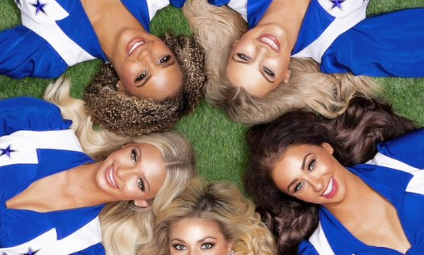The Dallas Cowboys Cheerleaders (DCC) are known for their dazzling performances and radiant smiles, but Netflix’s docuseries “America’s Sweethearts: Dallas Cowboys Cheerleaders” uncovers a much darker reality. The series shows how the cheerleaders’ dedication to spreading joy is taken advantage of by management, leading to severe issues such as eating disorders, injuries, and minimal pay.
The docuseries delves into the 2023 DCC squad formation, highlighting the grueling tryout process where both veterans and newcomers compete for one of the 36 spots. Even though cheerleaders can serve for up to five years, they must audition each year, facing stiff competition from younger and more athletic candidates. The DCC’s significant role in the Cowboys’ brand is evident, with the squad contributing to calendars, magazine spreads, and even Barbie dolls.
The ugly process of turning beautiful women into Dallas Cowboys Cheerleaders https://t.co/wYIpUe7PIj pic.twitter.com/yeIDwhqmDE
— small bussiness (@smallbusines4) July 13, 2024
Director Kelli Finglass and head choreographer Judy Trammell, both former DCC members, are in charge of the selection process. Appointed by Charlotte Jones, a member of the wealthy family that owns the Cowboys, Kelli and Judy have turned the DCC into a highly popular and profitable squad since the ’90s. However, their authority seems more inherited than earned, raising questions about their qualifications.
Kelli and Judy’s selection methods can be brutal, often resembling hazing more than professional evaluations. They harshly critique appearances, make culturally insensitive remarks, and put enormous pressure on veterans like Victoria Kalina, a four-year cheerleader who faces high expectations and body shaming.
Victoria’s struggle to maintain unrealistic body standards is a key focus of the series. The docuseries reveals the damaging effects of these pressures, as cheerleaders frequently face questions about their eating habits, disguised as concerns about “fueling” properly.
Despite the toxic environment, the cheerleaders form strong bonds and support each other, a stark contrast to the management’s behavior. The series captures moments of genuine friendship and camaraderie among the women, who stand by each other through the challenges.
In one episode, veteran Sophy alleges that a cameraman inappropriately touched her during a game. Kelli’s dismissive reaction and the lack of support during Sophy’s police statement highlight a disturbing disregard for the cheerleaders’ well-being.
The Dallas Cowboys Cheerleaders are balancing their families, work, training and more. But is it all a bit paradoxical?
Source: USA TODAY https://t.co/fRdmScSACY
— Between Provinces (@makeitBUtiful) July 13, 2024
Interviews with former cheerleaders like Kat Puryear and Caroline Sundvold reveal the harsh realities of life after DCC. They discuss physical injuries from demanding routines, financial struggles due to low pay, and the difficulty of finding jobs post-cheerleading. The DCC’s compensation, comparable to fast food wages, contrasts sharply with the significant revenue generated by the Dallas Cowboys.
The series raises important questions about the value placed on the DCC by the organization. While cheerleaders are constantly reminded of their importance, their compensation and treatment suggest otherwise. “America’s Sweethearts” draws parallels between the DCC’s standards and the broader societal pressures on American women to conform to harmful ideals.
What’s the NFL without Dallas ? Nothing. Damn football around the corner pic.twitter.com/ROXB1BlVFr
— AzTurfHead480 🇺🇲🏈⚾️ (@AzCowboys480) July 13, 2024
In the end, the docuseries uncovers the troubling truth behind the glamorous facade of the Dallas Cowboys Cheerleaders. It questions whether the sacrifices made by these women are truly worth it and if the allure of being a DCC is just part of a hollow fantasy perpetuated by those in power.
Key Points:
i. The docuseries uncovers the exploitation of Dallas Cowboys Cheerleaders, including eating disorders and low wages.
ii. The selection process is harsh, critiquing appearances and placing undue pressure on cheerleaders.
iii. Despite the toxic environment, cheerleaders form strong bonds and support each other.
iv. Former cheerleaders reveal physical injuries and financial struggles post-DCC.
v. The series questions the true value and treatment of DCC members compared to the revenue they generate for the organization.
Susan Guglielmo – Reprinted with permission of Whatfinger News



